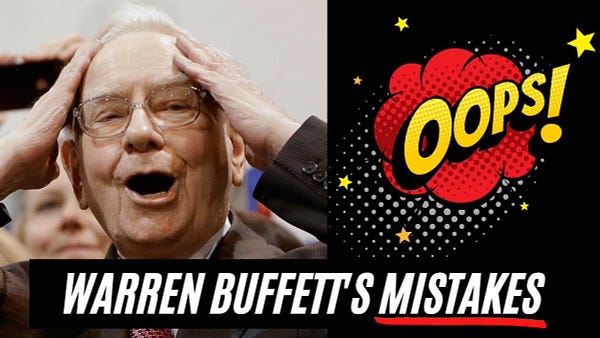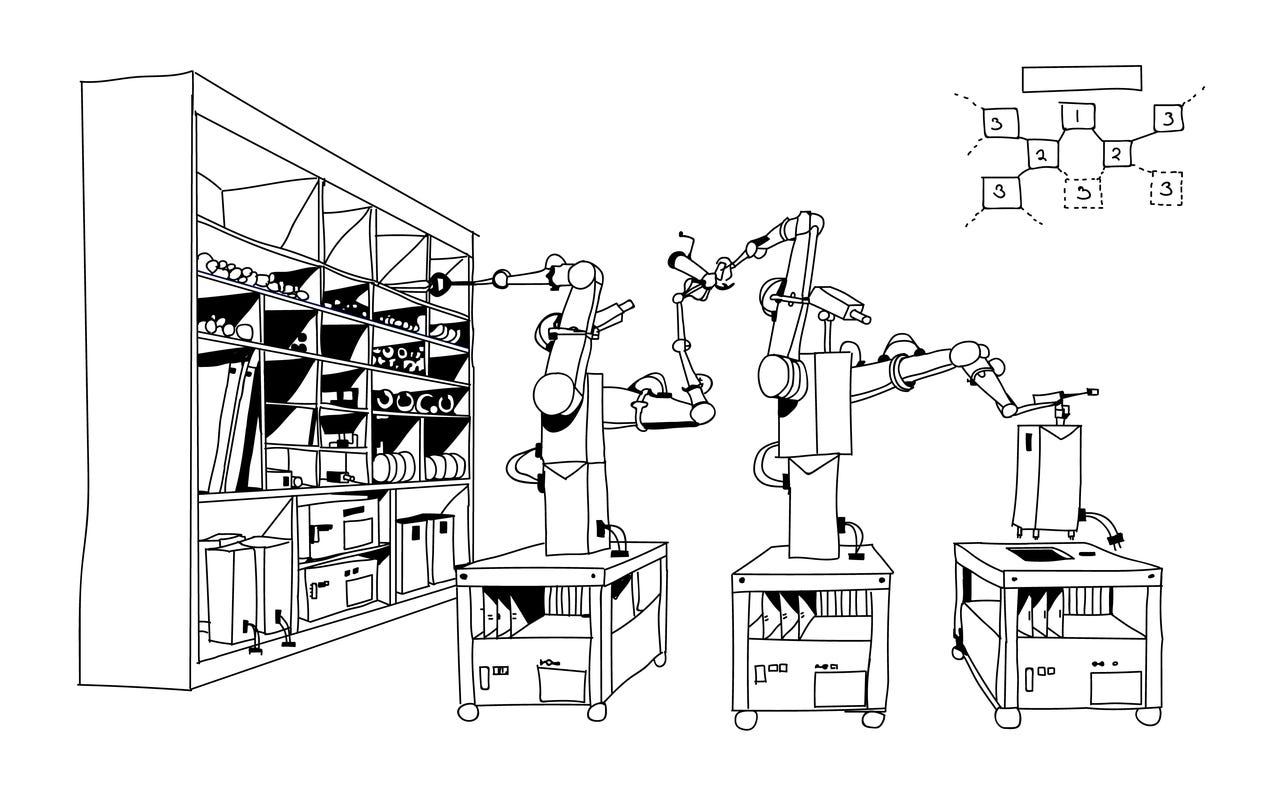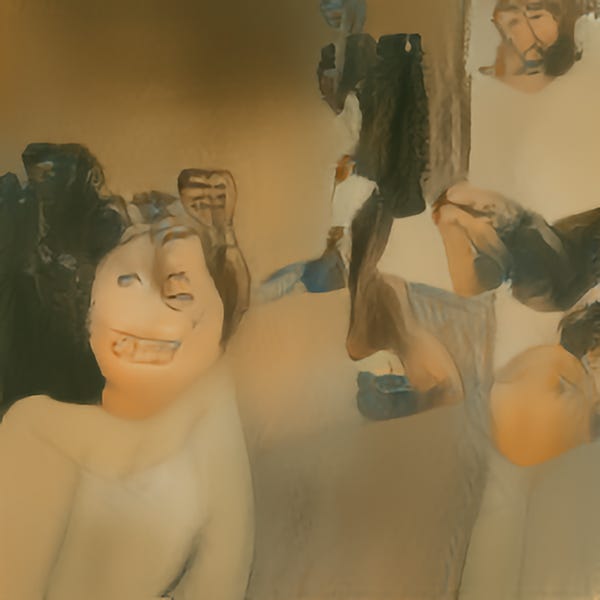Artist in the Cloud, Buffet Blunders, Hanging Rhinos, and Self Reproducing Machines
#17 of 10+1 Things
Welcome to #17 of 10+1 Things!
Thanks to everyone who bought me coffee last week. Your support keeps this newsletter up and running.
Here are 10+1 Things that I thought were worth sharing this week:
💡 One Big Idea
At an age where reading books have become something like a competitive sport, David Perell (one of my fav!) in a short essay explains the importance of 'One Big Idea'. We binge watch Ted talks, motivational videos or read self-improvement books, jumping from one idea to another, without exploring anything extensively. He explains the importance of focusing on one idea to build a career through the example of Rich Barton, the founder of billion-dollar companies like Expedia, Zillow, and Glassdoor. Even though these companies look different on the surface, these are all built on the concept of using the internet to bridge the gap between industry and consumers. David also follows a similar philosophy and works around the central idea of the internet’s impact on learning, entrepreneurship, and personal relationships.
[Read more about One Big Idea]
🧠 The Prediction Machine
Clayton Mansel from Synapse has written a great piece explaining why our brain is a great prediction machine by summarising concepts from Jeff Hawkin's book. According to the theory, the Neocortex part of our brain builds a predictive model of the world and makes predictions about what we will sense each second based on that model. Our brain constantly makes predictions about what we will see, touch, hear or taste based on our model of the world. To explain the concept, Clayton points to his experience while walking home from work carrying a backpack. Suddenly he felt like the backpack was lighter than usual and upon inspection, found that his water bottle was missing. In this case, the brain made a prediction based on its model of the backpack and made a prediction that something was missing. In a nutshell, our brain is a model building and prediction making machine!
[Read about how The Neocortex Builds a Model of the World]
✈️ Survivorship Bias
Survivorship Bias is a common logical error that distorts our understanding of our world when conclusions are made based on the attributes of success events while not considering the attributes of fail events. A classic example of Survivorship bias dates back to WWII when the American military asked mathematician Abraham Wald to study the best way to shield aeroplanes from being shot down. The initial plan of the military was to shield the parts of planes that were hit the most but upon inspection, Wald realized that the analysis was flawed as the military didn't consider the planes that never returned. The bullet holes they were looking at were from planes that returned and indicated areas of planes that could be hit and still be flown back to the base. Based on his reasoning Wald proposed the military to reinforce the areas which were not hit by any bullets.
[Read more about Survivorship Bias]
🦋 Insect Apocalypse
Insects are one of the most abundant and diverse animals present on earth and are essential to the ecosystem. Latest studies have indicated that insect populations are declining at alarming rates due to threats like climate change, destruction of wild habitats for farming, urbanization, pesticides and light pollution. Biologist Dave Goulson points out that insects have declined by 75% in the past 50 years and emphasized the vital services provided by them. To understand the gravity of the situation, we need insects for crop pollination, recycling - dung, leaves and, corpses, control pests, provide food for larger animals and more. As insects become more scarce, our world will slowly grind to a halt, for it cannot function without them.
[Read more about Insect Apocalypse]
Without insect pollination, we will have to Imagine a diet without strawberries, chilli peppers, apples, cucumbers, cherries, pumpkins, tomatoes, coffee, raspberries, beans and blueberries, to name just a few!
🤖 Self Reproducing Machines
Self Reproducing Machine is a type of robot that is able to reproduce autonomously using raw materials found in the environment, thus exhibiting a behaviour analogous to that found in nature. A team of researchers from the UK and Netherlands recently demonstrated a fully automated technology called Evosphere that allow physical robots to repeatedly breed, evolving their artificial genetic code over time to better adapt to their environment. The software present in the system uses algorithms to iterate robot designs virtually based on the environment and chooses the robot with the best design code. The chosen robot with the genetic code is fabricated in a 3d printer and is passed to the robotic arm that assembles it completely. As these new robots travel around, the successes and failures are fed back to the software, ensuring that the next generation of robots is better adapted.
[Read more about Self-Reproducing Robots]
Technologies like these are vital in the future when we have plans to start mining on the moon, create lunar factories or constructing satellites in space!
Reading this reminded me of a robot called Zed, on Swatkats! Anyone else a fan of Swatkats?
🦏 Hanging Rhinos
Namibia is home to one-third of the world's rhinos and these animals must be relocated often to maintain genetic diversity and to protect from poachers. Owing to the diverse and rugged terrain of the country, these animals are often airlifted, which is a complex task considering these animals weigh up to 1000 kilograms. Researchers from Cornell University recently conducted a study to determine which position is best for transporting these tranquillized animals. The results indicate that hanging rhinos upside down are the least dangerous as oxygen levels and measures of ventilation were high in this position. The results were a great relief for conservationists as hanging animals upside down is faster, easier and least expensive. The study attracted widespread media attention and was even awarded the 2021 Ig Nobel Prize(A satirical prize)!
[Read more about Hanging Rhinos]
👩🎨Artist in the Cloud
I have featured multiple artists in this newsletter, but this week I'm exploring the art by an artist called Auria Kathi. Auria Kathi is the first Artificially Intelligent poet-artist living completely in the cloud. Auria Kathi was created as a machine learning (ML) art project by Fabin Rasheed and Sleeba Paul. The trained ML model first creates short poems that are random in nature and images are generated based on these. Using algorithms, these images are coloured and are posted on Instagram. Auria now is a standalone artist and keeps posting a poem and an artwork every day. Even the face of Auria was created using generative art. The works by the AI-driven artist was even featured in the Florence Biennale.
[Check out Artworks by Auria Kathi]
🧵 Buffet Blunders


Warren Buffet is known as one of the best investors in modern history and has a net worth of more than $100 billion. In an interesting Twitter Thread, Tar shares some insights on the investing mistakes by Buffet, also known as Buffet Blunders. He explores each of these in detail and explains what we can learn from these examples. From investing in Tesco to missing out on Google, this thread is an excellent example of how investing can be unpredictable even for a seasoned investor like Buffet.
[Check out the thread]
🎬 How to Make a Netflix Style Documentary
I've enjoyed watching a video by Paul E.T. where he shows how to make a Netflix style documentary about anything. Using 2 entry-level cameras, 2 lenses, lighting, some stock footage, piano notes and editing, Paul creates an excellent Netflix style documentary called 'The Bread Loser'. Even though it is shot in a satirical way and explores the story of how his bread toast was stolen, the video shows that creating content has become easier than ever before and why skills matter over fancy gear!
[Watch the video]
📚 The Art of Noticing
I finished reading Superhuman yesterday and have started reading a book called The Art of Noticing by Rob Walker. In a world we are distracted by digital technology and having zero attention span, Rob illustrates 131 ways to become a clearer thinker, a better listener, a more creative person and rediscover your passion.
[Check out the book on Amazon]
Note: Do not expect anything groundbreaking from this book, but these are 131 fun experiments you can do like 'Document the Identical' or 'Make an Auditory Inventory'. So far, these experiments have been amazing to me and require an unusual shift from everyday thinking, which in my opinion is the key to creativity!
🎵 What I'm listening to
It has been a hectic week in terms of work, but I've enjoyed this Work/Productive Chill Music Mix by Fludified.
[Listen to the Music]
I've been listening to this on loop, but the album art brought memories from my student life in Scotland!
📣 Berkana
I’ve enjoyed reading a newsletter called Berkana lately. Berkana is a weekly newsletter that covers obscure vignettes of culture from across the world. Swarnali, who runs Berkana, writes cultural commentary on the current zeitgeist - lives of women from marginalized communities, forgotten oppressive history, underprivileged children, feminine sexuality, and the ecological holocaust. Berkana's purpose is to drive social change and evoke emotions that instil urgency in actions.
[Check out Berkana]
That’s 10+1 Things for the week.
This newsletter is free, but not cheap. It takes a lot of effort and time from my end (7~8 hours) to deliver this newsletter every week. You can help me in keeping it going by forwarding it to someone you like, leaving a testimonial, buying me a coffee ($1 or ₹75), sending me some crypto, visiting my blog or following me on Twitter.
See you next week!
With Love,
Rishi
Quote of the Week
“Often the difference between a successful person and a failure is not one's better abilities or ideas, but the courage that one has to bet on one's ideas, to take a calculated risk—and to act."
~ André Malraux







Excellent post rishikesh. I Cant agree more on the survivorship bias; I recall a similar concept on 'selective abstraction.'
Yayy Berkana got featured.. Thanks Rishi ❤️. We at Berkana love 10+1 things and your perspective on diverse ideas. Keep up the good work!!